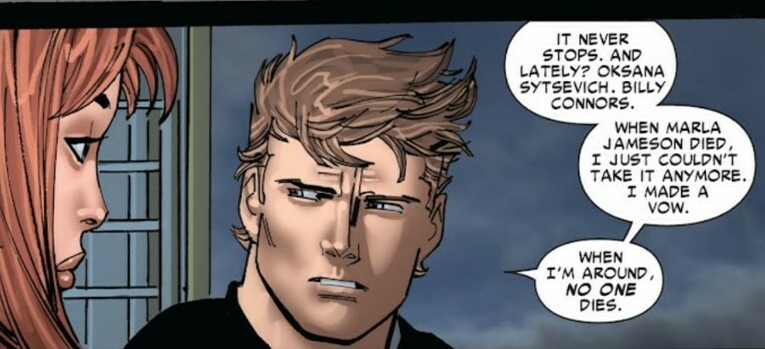
Marvel Comics has been a cornerstone of popular entertainment for decades. Its characters, stories, and themes have captivated millions, offering not just escapism but food for thought. In this article, we’re diving into three key themes that often surface in these stories: idealism, reality, and over-confidence.
Marvel isn’t just about heroes in costumes battling menacing villains. It’s a rich tapestry woven with philosophical ideas and moral questions. You might encounter characters grappling with the stark differences between their idealistic views and harsh realities. You may see heroes and villains alike falling victim to over-confidence, believing they’re invincible or infallible, only to face the consequences of their hubris.
These themes aren’t just confined to the pages of comic books. They resonate with our everyday lives, making these stories timeless and relatable. So, as you journey through the Marvel Universe, remember that there’s more beneath the surface—philosophical lessons that reflect our own struggles, aspirations, and pitfalls.
We’ll explore how Marvel’s writers and artists bring these themes to life, offering insights and lessons along the way. From the optimistic yet challenging idealism of Peter Parker to the Icarus-like over-confidence of many characters, these comics present a nuanced look at human nature and morality.
Understanding these themes not only enriches your appreciation for these stories but also offers valuable insights into the human condition. Marvel Comics serves as a mirror, reflecting our ideals, our flaws, and the complex reality we navigate every day. Continue with me as we examine the philosophy of Marvel comics.
This post contains affiliate links. If you make a purchase through these links, I may earn a commission at no extra cost to you.
Defining Reality in the Marvel Universe
Realism is a crucial concept in storytelling that aims to present situations and characters in a manner that is true to real life. In the context of Marvel Comics, realism doesn’t just mean gritty, grounded settings—though there’s plenty of that. It’s about the authenticity and emotional truth that characters exhibit, even in the most fantastical situations.
Take Marvel’s New York City. It’s a vibrant backdrop for many superheroes, reflecting a real place bustling with life. Yet, when Spidey swings through the towering skyline or the Avengers battle alien invaders, it’s the characters’ real emotional reactions and struggles that ground these stories. They laugh, they hurt, they fear failure—authentic human experiences in extraordinary situations.
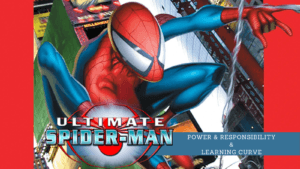
Writers like Brian Michael Bendis (Ultimate Spider-Man) and Frank Miller (Daredevil) excel in this portrayal. Bendis’s work on Ultimate Spider-Man, which started in 2000, is often praised for bringing Peter Parker’s world to life with intricate detail, making his problems feel as real as those faced by any teenager. Frank Miller’s Daredevil run during the 1980s brought a gritty layer of realism to the character, featuring dark, emotionally charged storylines that delved into Matt Murdock’s psyche.
This realism is crucial in maintaining reader engagement. When characters and situations feel real, readers become more invested. They care about what happens next because it mirrors the unpredictability of real life. This connection forms the heart of many Marvel stories, allowing them to transcend mere entertainment and become reflections of our own world.
Idealism in the Marvel Universe: Heroes and their Aspirations
Idealism often serves as the moral compass for many Marvel heroes, guiding their actions and decisions. It represents the ambitions, hopes, and higher standards that these characters strive to uphold, even when the odds are against them.
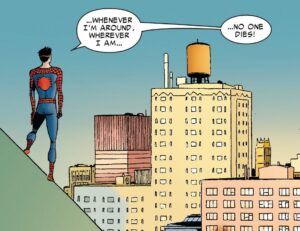
A quintessential example of idealism in Marvel lore is Peter Parker’s (Spider-Man) unwavering determination to ensure that “no one dies on my watch.” This mantra wasn’t just a catchphrase for him but a core principle driving his every action. He fights for the innocent and even goes out of his way to save his enemies whenever possible. Created by Stan Lee and Steve Ditko, Spider-Man debuted in 1962’s “Amazing Fantasy” #15, and Peter’s moral struggles became one of the most relatable aspects of the character.
Another character embodying idealism is Captain America. Steve Rogers epitomizes the fight for justice, freedom, and what he considers to be American ideals. Created by Joe Simon and Jack Kirby and first appearing in “Captain America Comics” #1 in 1941, Cap’s unwavering dedication to his principles often puts him in conflict with friends, foes, and even the government. His storylines challenge the balance between idealistic values and pragmatic decisions—a relevant and timeless struggle.
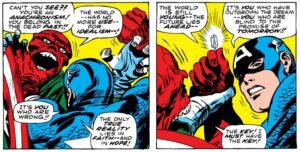
Jean Grey (Marvel Girl/Phoenix) from the X-Men series, created by Stan Lee and Jack Kirby, also wrestles with her idealistic values. Debuting in 1963’s “X-Men” #1, Jean’s journey from student to one of the most powerful mutants touches on themes of idealism versus control. Her struggle to harness the Phoenix Force while aiming to protect both human and mutant kind showcases how challenging it can be to maintain one’s ideals in the face of overwhelming power.
As an Amazon Associate, I earn from qualifying purchases.
Purchase a beautiful collection of X-Men – 666 pages!
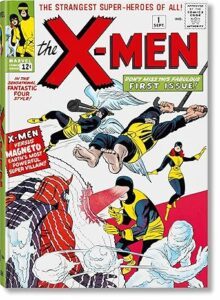
Writers like Mark Millar in “The Ultimates” (2002) bring out the complexities of idealism within team dynamics. The Avengers, in this reimagined series, grapple with their dreams of heroism and public expectations, often highlighting the tension between individual ideals and collective goals.
Idealistic heroes in Marvel Comics remind readers of the importance of holding onto one’s principles despite adversities. They show that while reality often tests these ideals, maintaining them can inspire hope and bring about positive change. Idealism gives these heroes their moral backbone, shaping their narratives and enriching the Marvel Universe with stories of courage and conviction.
The Icarus Syndrome: Over-Confidence in Marvel Comics
The Icarus syndrome, deriving its name from the Greek myth of Icarus, exemplifies the dangers of over-confidence. Icarus, who flew too close to the sun despite warnings, ultimately met his doom when his wax wings melted. This mythological cautionary tale finds its echoes in Marvel Comics, where characters often suffer the consequences of unchecked hubris.
Over-confidence in the Marvel Universe manifests in various ways. Heroes and villains alike fall prey to the belief that their power, intelligence, or skill makes them invincible. This over-confidence can lead to reckless decisions and eventual downfall.
Tony Stark (Iron Man) frequently battles his own over-confidence. Created by Stan Lee, Larry Lieber, Don Heck, and Jack Kirby, Tony debuted in 1963’s “Tales of Suspense” #39. His belief in his technological prowess often leads him to take enormous risks. In the “Demon in a Bottle” storyline (1979) by David Michelinie and Bob Layton, Tony’s unchecked confidence in himself as both a hero and inventor causes him to spiral into alcoholism when things go wrong.
Reed Richards (Mr. Fantastic), one of the most intelligent characters in Marvel, also embodies over-confidence. Introduced by Stan Lee and Jack Kirby in 1961’s “Fantastic Four” #1, Reed’s conviction in his intellectual superiority sometimes blinds him to the human costs of his actions. His overconfidence has led to strained relationships, particularly with his wife, Sue Storm.
Villains also fall victim to this trait. Doctor Doom, another creation of Lee and Kirby, first appearing in 1962’s “Fantastic Four” #5, exemplifies over-confidence. Doom’s belief in his own superiority and his quest for ultimate power frequently result in his downfall. Despite his astounding intellect and abilities, his arrogance ensures that his plans are often foiled by the very traits he disregards in others—humility and cooperation.
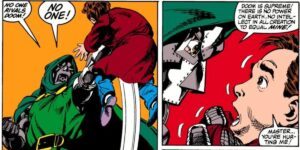
The Icarus syndrome serves as a narrative device to remind readers of the perils of over-confidence. By showcasing the rise and fall of characters driven by hubris, Marvel Comics offers a reflection on the importance of self-awareness and the need for balance between ambition and humility. These stories resonate because they highlight the universal struggle with pride and the lessons learned from it. This theme consults readers to examine their confidence, reminding us all that unchecked belief in oneself can lead to peril.
Heroes and Hubris: A Study of Over-Confidence
Over-confidence isn’t reserved just for Marvel’s villains; many heroes experience this pitfall. When heroes believe too strongly in their capabilities, they often face harsh lessons. Their journeys become even more compelling as they strive to balance self-assurance with humility.
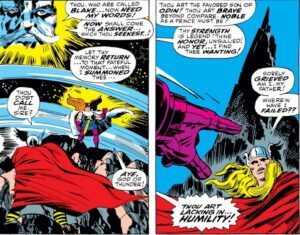
Take Thor, for instance. Created by Stan Lee, Larry Lieber, and Jack Kirby, Thor first appeared in 1962’s ‘Journey into Mystery’ #83. As the Norse God of Thunder, Thor’s natural confidence borders on arrogance. His over-confidence leads him to countless battles where he’s nearly defeated or learns the value of humility. His initial banishment to Earth by Odin serves as a stark reminder of the dangers of unchecked pride and the importance of learning humility.
Buy this impressive model – 979 pieces!
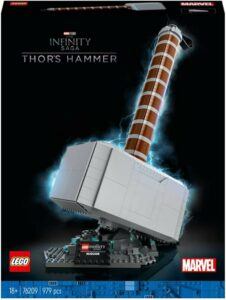
Another example is Tony Stark. Throughout various arcs, Tony’s self-assured nature often results in complicated situations. In ‘Civil War’ (2006-2007), written by Mark Millar and illustrated by Steve McNiven, Stark’s unwavering belief in his stance on the Superhero Registration Act leads to a violent superhero clash, causing significant fallout. His journey through this storyline showcases how over-confidence can alienate allies and lead to unforeseen consequences.
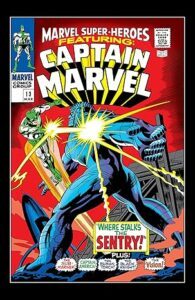
Carol Danvers (Captain Marvel) also grapples with over-confidence. Initially created by Roy Thomas and Gene Colan and appearing in 1968’s ‘Marvel Super-Heroes’ #13, Carol’s transformation into Captain Marvel amplifies her confidence. In ‘The Life of Captain Marvel’ (2018) by Margaret Stohl and Carlos Pacheco, Carol’s journey highlights the thin line between confidence and arrogance. Her overestimation of her abilities often puts herself and others in danger, forcing her to reevaluate her approach.
Over-confidence in heroes isn’t just a flaw; it’s a narrative tool that underscores their humanity. Through their trials, readers witness their growth and transformation. These stories serve as reminders that even heroes need to balance their strengths with caution and self-awareness, making them more relatable.
Villains and the Downfall of Over-Confidence
Over-confidence isn’t limited to Marvel’s heroes; it’s a trait that often leads to the ruin of many villains. Their belief in their superiority and infallibility usually sets the stage for their ultimate defeat.
Norman Osborn, also known as the Green Goblin, is a prime example. Created by Stan Lee and Steve Ditko, and first appearing in 1964’s ‘The Amazing Spider-Man’ #14, Osborn’s over-confidence in his intellect and schemes frequently leads him into direct conflict with Spider-Man. His belief that he can outsmart and overpower Spidey repeatedly leads to his downfall. The narrative often focuses on how his inflated ego blinds him to the realities of his limitations and the resilience of his opponent.
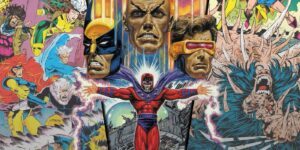
Another classic case is Magneto. Introduced by Stan Lee and Jack Kirby in 1963’s ‘X-Men’ #1, Magneto’s conviction in the superiority of mutants often pushes him towards extreme measures. His over-confidence in his philosophies and abilities leads to numerous battles with the X-Men. In the ‘Fatal Attractions’ storyline (1993), written by Fabian Nicieza and Scott Lobdell, Magneto’s arrogance reaches its peak, resulting in catastrophic consequences for both himself and his followers.
Doctor Doom, created by Stan Lee and Jack Kirby and introduced in 1962’s ‘Fantastic Four’ #5, epitomizes over-confidence among Marvel villains. Doom’s belief in his unmatched intelligence and power frequently leads to elaborate plans that ultimately fail. His downfall usually stems from underestimating his opponents and overestimating his strategies. Despite his brilliance, Doom’s hubris continually ensures that his victories are short-lived or incomplete.
These stories of villainous over-confidence provide valuable lessons. They remind readers that arrogance can blind one to potential pitfalls and overestimation of one’s abilities can lead to ruin. Observing these villains grapple with their hubris offers a reflective mirror on the importance of humility and awareness of one’s limitations. Through their defeats, readers can understand the perils of unchecked ambition and the value of pragmatic self-assessment.
The Interplay between Idealism, Reality, and Over-Confidence
In the Marvel Universe, the themes of idealism, reality, and over-confidence are deeply intertwined. This complex interplay shapes character arcs and drives storylines, offering a rich tapestry of moral and philosophical questions.
Characters in Marvel stories often start with high ideals. They aspire to create a better world, save lives, and uphold justice. However, these ideals are frequently challenged by harsh realities. For instance, Peter Parker’s commitment to ensuring no one dies on his watch is continually tested by the chaotic and unpredictable nature of his life as Spider-Man. Whether it’s facing brutal villains or dealing with personal loss, the gap between his ideals and reality creates significant tension and growth.
Adding over-confidence to the mix complicates things further. Characters who are initially optimistic might, over time, start believing too much in their abilities. This over-confidence can lead to critical mistakes. Tony Stark’s confidence in his technology might blind him to ethical implications, while Reed Richards’ belief in his intellectual superiority often puts his team at risk. These instances highlight the fallibility of even the most powerful characters and the thin line between confidence and hubris.
In ‘Civil War’ (2006-2007), written by Mark Millar and illustrated by Steve McNiven, this dynamic is vividly portrayed. Stark and Rogers represent two differing sets of ideals clashing against each other. Stark’s over-confidence in the Superhero Registration Act and Rogers’ unwavering belief in personal freedom drive the entire Marvel Universe into a conflict that blurs the lines between heroism and villainy.
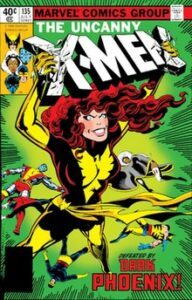
Similarly, Jean Grey’s struggle with the Phoenix Force demonstrates how ideals and over-confidence can both empower and destroy. Her initial idealistic desire to harness the Phoenix Force for good is eventually overshadowed by the overwhelming confidence in her own powers, leading to catastrophic outcomes. This storyline, notably explored in the ‘Dark Phoenix Saga’ (1980) by Chris Claremont and John Byrne, encapsulates how these themes intricately weave together to shape a character’s destiny.
The thematic interplay in Marvel Comics is not just about the characters’ victories or failures. It’s about the journey, the lessons learned, and the balance between ideals and reality. The push and pull between striving for greatness and acknowledging human limitations make these stories resonate on a deeper level. By examining these themes, readers gain insights into their own lives, understanding the value of balancing ambition with prudence and idealism with realism.
In essence, the convergence of idealism, reality, and over-confidence in Marvel stories enriches the narrative fabric. It creates multifaceted characters and intricate plots that delve into the core of human experience, making Marvel Comics not just a source of entertainment, but a lens through which readers can explore fundamental ethical and philosophical questions in their own lives.
Conclusion: Reflecting on the Philosophical Depth of Marvel Comics
Marvel Comics offers more than just action-packed adventures and colorful characters. It delves deep into philosophical and moral themes, making its stories resonate on a profound level. The examination of idealism, reality, and over-confidence within these narratives enhances our understanding of the heroes and villains we follow.
Through characters like Peter Parker, who strives to uphold his idealistic values despite facing numerous challenges, we learn the importance of keeping our principles intact. Meanwhile, observing the pitfalls of over-confidence in characters such as Tony Stark or Magneto offers a cautionary tale about the dangers of unchecked ambition. These story arcs and character developments enrich our engagement with the Marvel Universe.
The writers and artists behind these beloved stories, from Stan Lee and Jack Kirby to Brian Michael Bendis and Chris Claremont, have crafted narratives that challenge readers to think critically about morality, personal growth, and the delicate balance between aspiration and reality. These creators invite us to reflect on our own lives and the choices we make, mirroring the complexities faced by their characters.
Marvel Comics thus serves as a powerful medium to explore human nature, offering timeless lessons through its blend of ordinary struggles and extraordinary scenarios. The blend of idealism, realism, and the reckoning with over-confidence helps create stories that are both entertaining and deeply meaningful.
As you explore more Marvel stories, take a moment to consider these themes and how they relate to your own experiences. The depth and richness of Marvel Comics lie not just in its fantastic tales, but in the philosophical questions it poses and the reflections it inspires.
What are your thoughts on idealism, reality, and over-confidence in Marvel comics! Share your thoughts below and start the discussion!
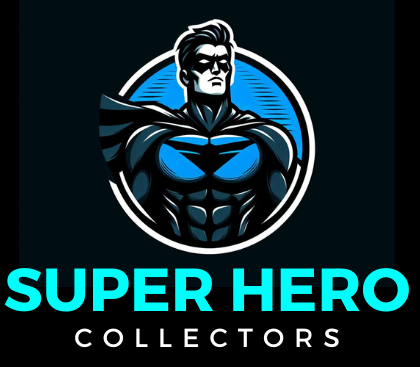
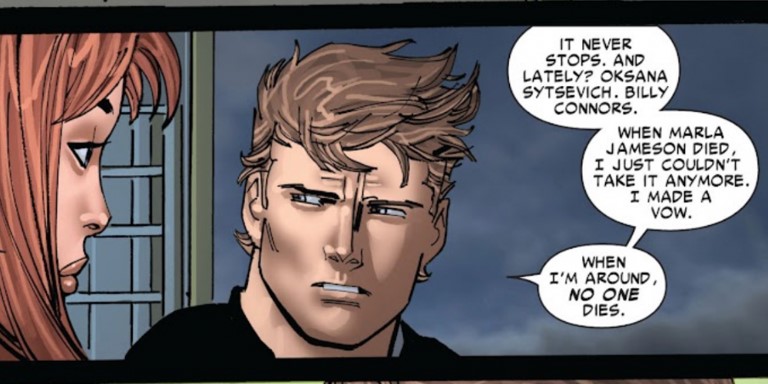
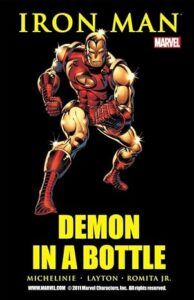
This is a very interesting read on the philosophy of Marvel comics and the use of idealism, overconfidence and reality in the stories. I have always loved Spiderman and his mantra of nobody dies on his watch.
But one can understand how overconfidence can lead to characters being wreckless and taking unnecessary chances. Do you think the creators of Marvel comics has a moral obligation to protect their readers from not copying what the characters are doing which could be harmful or dangerous? Thank you.
Hi,
Welcome back!
Thank you for your thoughtful comment and for sharing your love for Spider-Man! His mantra of ensuring “nobody dies on his watch” truly highlights the idealism and responsibility that define his character. Spider-Man’s struggles often remind us that even with good intentions, overconfidence can lead to reckless decisions and unintended consequences.
Regarding your question about whether Marvel creators have a moral obligation to protect readers from imitating potentially harmful behaviors, it’s an intriguing point. Comic book creators often walk a fine line between crafting engaging stories and considering the impact of their narratives. While they aren’t necessarily responsible for the actions of their readers, many creators do strive to address the consequences of their characters’ actions, highlighting the importance of accountability and learning from mistakes.
Marvel’s stories often explore themes of growth and redemption, showing characters who learn from their missteps and evolve over time. This can serve as a reminder that while superhero tales are fictional, they offer valuable lessons about resilience, empathy, and the importance of making thoughtful choices.
Ultimately, comics can inspire and provoke reflection, but readers also have a role in discerning fiction from reality and understanding the broader messages behind the stories. Thanks again for your comment and for engaging with the philosophical aspects of Marvel comics!
– Scott
Hello Scott,
This is a fantastic exploration of the philosophical dimensions of Marvel Comics! I appreciate how you have highlighted the interplay between idealism, reality, and over-confidence in these stories. It is fascinating to see how characters like Spider-Man and Captain America grapple with their lofty ideals while facing real-world challenges and limitations.
The way Marvel blends authentic emotional experiences with larger-than-life scenarios really does make these tales resonate on a deeper level. Your insights into how realism and idealism are portrayed in these narratives offer a great way to appreciate the complexity and depth of Marvel’s storytelling.
Thanks for shedding light on these themes, it is a reminder of how comic books can offer profound reflections on human nature and morality.
Hi StarLight,
Thank you for your comments. I’m happy you found the article interesting.
– Scott
Wow it’s very interesting to see that you have such interesting and deep philosophical reflections in comics! I’ve always suspected that comics were deeper than they appeared. I especially like the over-confidence story of Icarus syndrome. My father told me the story when I was a child. And it’s funny to see it appears everywhere in comics! I was also surprised to see hubris addressed here. Very interesting article!
Thank you so much for your thoughtful comment! I’m glad you found the philosophical reflections in Marvel comics intriguing. Comics do often explore deeper themes than they might initially seem to, and it’s fascinating to see how classic stories like the Icarus myth and themes of hubris resonate in modern superhero narratives. It’s a testament to how timeless concepts can be reimagined and explored through different lenses. I’m glad you enjoyed the article, and I appreciate your insight on the connections between these themes and the stories we see in comics! If you have any other topics or characters you’d like to see explored, feel free to let me know.
Incidentally, the old story of Icarus is actually seen in the Eternal’s movie in the MCU. One of the Eternals is named Ikaris.
Come back soon for more superhero fun!
– Scott
Hi Scott,
It seems like you’re interested in discussing or asking questions about the article titled “The Philosophy Of Marvel Comics – Idealism, Reality, And Over-Confidence” by Scott. Here are some potential questions you might consider:
Themes Exploration: The article discusses idealism, reality, and over-confidence in Marvel Comics. How do these themes interplay to create complex character arcs, and which characters do you think best embody these concepts?
Character Development: How does the theme of over-confidence manifest in both heroes and villains within Marvel Comics, and what lessons do these narratives offer regarding the dangers of hubris?
Philosophical Reflections: The article suggests that Marvel Comics serves as a mirror to our struggles and aspirations. How do these stories help readers reflect on their personal lives and moral decisions?
Comparative Analysis: How does the portrayal of realism in Marvel Comics, as discussed in the article, differ from that in other superhero universes like DC Comics?
Idealism and Realism Conflict: How do characters like Spider-Man and Captain America navigate the tension between their values and the harsh realities they face? Can you think of other characters who face similar conflicts?
Impact of Writers and Artists: The article mentions various writers and artists who have shaped these philosophical themes in Marvel Comics. How do you think their unique contributions have influenced the moral and ethical depth of the Marvel Universe?
Narrative Devices: The concept of the Icarus syndrome is used as a narrative device in Marvel Comics. Can you think of other myths or archetypes similarly employed to explore character flaws in the Marvel Universe?
Reader Engagement: The article asserts that realism in characters’ emotional experiences is crucial for reader engagement. Do you agree with this assertion?
Cultural Relevance: How do the themes of idealism, reality, and over-confidence in Marvel Comics resonate with contemporary societal issues?
Personal Reflection: After reading the article, which Marvel character’s philosophical struggles do you find most relatable or inspiring, and why?
These questions can help you delve deeper into the themes and ideas presented in the article and engage in a thoughtful discussion about the philosophical aspects of Marvel Comics.
All the best
Robbie
HI Robbie,
Wow! Those are some really well-thought out questions, but I’m not sure if you are suggesting these questions for my readers or for me to think more about what I wrote.
Some of your questions dealt with “realism” and that made me think about my post. My article uses the word “reality” not “realism” in the title. Then I realized that my last sentence that encouraged my readers to engage and join the discussion used “realism” in error. I have changed that.
I wanted to discuss Reality not Realism in my post. There is a difference. There are many websites out there that talk about Realism in Marvel Comics, and it seems that most commenters are not happy with Realism in comics, at least not the way it’s been headed.
Realism in comics refers to the portrayal of characters, settings, and narratives in a way that reflects real-world physics, human emotions, and social issues. Marvel Comics is known for its attempt to inject realism into its superhero stories in several ways:
Relatable Characters: Marvel characters often have complex personalities and personal problems, making them more relatable to readers. For example, Spider-Man/Peter Parker deals with everyday issues like paying rent, school pressures, and relationships.Moral Ambiguity: Characters are frequently faced with ethical dilemmas and moral choices, adding depth and complexity to their actions. This reflects the real-world notion that life is rarely black and white.Societal Issues: Marvel stories often tackle real-world issues such as discrimination, inequality, and political corruption. The X-Men, for instance, have been used as an allegory for various civil rights movements.Scientific Plausibility: While the science in comics is often exaggerated or fictionalized, Marvel tends to ground its stories in some semblance of scientific reality, using concepts that are familiar or plausible within the context of the universe.
When I write about “reality,” I am addressing what is real to the characters in the comics, what happens in their lives that come in direct opposition to their ideals or over-confidence. The reality is what is real in the story itself, not what appears real to us. Characters have super powers or their are supernatural elements. That is fiction to us, but it is reality within the story. While Marvel stories often involve fantastical elements, they maintain internal consistency within the universe. This means that while a character like Doctor Strange might use magic, the rules governing that magic are consistent within the story’s context.
Your questions about realism are very interesting and in-depth, but as you can see, are now not relevant to this article. They are very interesting though, and I will keep them in mind for future articles. I often get ideas from my readers.
Which of your questions resonates with you? What are your thoughts on this one?
Reader Engagement: The article asserts that realism in characters’ emotional experiences is crucial for reader engagement. Do you agree with this assertion?
Keep coming back for more superhero fun!
– Scott
Thanks for a discussion on an interesting and sometimes not considered topic. What makes Marvel Comics so popular is that they are absolutely relatable to the human condition. Our heroes and villains for that matter have characteristics that we see in ourselves and other humans. It adds a touch of reality to unreal characters making the stories more complex and fascinating. Truely getting the audience in.
Hi Lyn, thank you for your comment! I have been noticing Idealism, over-confidence, and reality in the comics as I read them. I thought it would make a great discussion. I am happy that you appreciate the discussion.
Please keep coming back for more superhero fun!
– Scott
Hi Scott,
I really enjoyed how you wrote your post. Your exploration of how characters like Captain America and Iron Man embody idealism and the tension between their aspirations and reality was spot on. I particularly liked how you highlighted the role of overconfidence in their stories, showing how it leads to both their greatest successes and most profound failures. Your insights made me think more deeply about the complexities in Marvel’s storytelling. Great job!
Hi Annastasia!
Thank you so much for your thoughtful comment! I’m thrilled to hear that you enjoyed the post and that it resonated with you. Marvel’s storytelling is indeed rich with complexity, and characters like Captain America and Iron Man exemplify the tension between idealism and reality in fascinating ways. Their journey highlights how overconfidence can be a double-edged sword, driving them to achieve incredible feats but also leading to their downfalls. I’m glad my insights sparked deeper thinking about these themes—it’s always rewarding to engage with readers who appreciate the nuanced storytelling that Marvel offers. Thanks again for reading, and feel free to share any further thoughts or questions!
Best,
Scott
The way you dissected these elements through Marvel’s characters really brings new depth to the stories. I’m curious, though—do you think Marvel’s portrayal of these themes has evolved over the years, or do they tend to stick to the same philosophical roots? It’d be interesting to see how different eras of Marvel have tackled these ideas. Thanks for sharing!
Hi Andy,
Thank you for your thoughtful comment! I’m glad you found the analysis of Marvel’s themes engaging. Marvel Comics has indeed evolved in its portrayal of idealism, reality, and over-confidence over the years, while still staying true to its philosophical roots. Here’s a closer look at how these themes have been tackled across different eras:
1. The Silver Age (1960s-1970s): During this period, Marvel introduced many iconic characters like Spider-Man, the X-Men, and the Fantastic Four. The themes of idealism and responsibility were particularly prominent, with characters often portrayed as relatable individuals facing real-world problems. This era emphasized the idea that heroes could be flawed and that their personal struggles made them more human. For example, Spider-Man’s constant balancing act between his personal life and his responsibilities as a superhero highlighted the theme of responsibility and the cost of idealism.
2. The Bronze Age (1970s-1980s): As societal issues became more complex, Marvel began to explore themes of reality and social justice more deeply. Stories during this time often addressed real-world issues such as racism, drug addiction, and political corruption. The X-Men, for example, became a metaphor for civil rights movements, dealing with themes of prejudice and acceptance. This era saw a shift towards more mature storytelling, reflecting a growing awareness of the complexities of the world.
3. The Modern Age (1990s-Present): In recent decades, Marvel has continued to evolve its portrayal of these themes, often exploring the psychological depth of its characters. The theme of over-confidence is frequently examined through characters like Tony Stark, whose technological ambitions often lead to unintended consequences. Modern Marvel stories tend to focus on the moral ambiguities faced by heroes, reflecting a world where clear-cut answers are rare. The emphasis on diversity and inclusion has also become more pronounced, with a broader range of characters and perspectives enriching the narrative landscape.
Consistency in Philosophical Roots: Despite these evolutions, Marvel has consistently explored the interplay between idealism, reality, and over-confidence. The philosophical roots established in the early days of Marvel remain present, as the stories continue to delve into what it means to be a hero in a world that is both inspiring and challenging.
Marvel’s ability to adapt these themes to reflect contemporary issues while maintaining their core philosophy is part of what keeps its stories relevant and compelling. It’s fascinating to see how different eras have brought new dimensions to these timeless themes, allowing readers to continually find new meanings in the stories. Thanks again for your comment, and I hope this exploration adds even more depth to your understanding of Marvel’s storytelling evolution!
Please come back for more superhero fun!
– Scott
I really enjoyed reading this article! The way it delves into the balance between idealism and reality in Marvel Comics is spot on. I loved how you highlighted how Marvel heroes often struggle with their own flaws, making them so relatable and real. The discussion on over-confidence, especially in characters like Tony Stark, was super insightful. I’m curious, though—how do you think this balance of idealism and realism compares to DC Comics? Do you think Marvel’s approach is more grounded in reality, or is there still a bit of idealism at play?
Hi Bob!
Welcome back! I’m thrilled you enjoyed reading my article.
I’m glad you enjoyed the article! Marvel Comics does an excellent job of exploring the balance between idealism and reality through its complex characters. The heroes’ struggles with personal flaws and over-confidence add depth to their stories and make them relatable.
That is great question about realism in Marvel and DC comics. Before I answer that, I want to address the difference I see between Reality and Realism, at least in how I wrote my article. Realism in comics refers to the portrayal of characters, settings, and narratives in a way that reflects real-world physics, human emotions, and social issues. Marvel Comics is known for its attempt to inject realism into its superhero stories. We see this through Relatable Characters, Moral Ambiguity, Societal issues (discrimination, inequality, political corruption).
Reality, as I see it and used in my article, refers to the narrative framework and internal logic of the Marvel Universe. Reality is what actually happens to the characters in the story. I put reality up against idealism. For instance, Spider-Man says no one is going to die when he is around, but the reality of the universe (or multiverse) in which lives comes to view, and people do die when he is around. The over-confidence of Thor leads him to say that he has to handle a huge issue alone, but the reality is that he really needed some help from the rest of the Avengers.
Your question about realism in Marvel vs. DC is a good one, though. The portrayal of realism in superhero comics can vary significantly between different universes, such as Marvel and DC Comics, reflecting each publisher’s distinct approach to storytelling and character development.
Marvel Comics: Marvel is renowned for its emphasis on “the world outside your window.” This philosophy manifests in a universe that closely resembles our own, with characters who deal with everyday struggles alongside their super heroic endeavors. Marvel heroes often grapple with personal issues, such as Peter Parker’s financial woes or Tony Stark’s battle with alcoholism. This grounded approach creates a sense of realism by making the characters relatable and their worlds familiar. Marvel’s New York City, for example, is a bustling, vibrant backdrop that mirrors the real city, grounding the extraordinary events that take place within it.
DC Comics: DC’s approach to realism tends to focus more on larger-than-life archetypes and mythic narratives. While DC characters like Batman and Superman inhabit a world similar to our own, their stories often delve into grand, symbolic themes. Gotham City and Metropolis, while inspired by real places, are more stylized and represent broader concepts like crime and hope. DC’s heroes are often portrayed as iconic figures, embodying idealized traits and virtues. This can create a different kind of realism, one that explores moral and philosophical questions on a more epic scale.
While both Marvel and DC Comics incorporate elements of realism, they do so in distinct ways. Marvel’s realism is characterized by its focus on character-driven stories and the authentic human experience, emphasizing personal growth and moral complexity. DC’s realism, on the other hand, often explores the symbolic and aspirational aspects of heroism, using its characters to tackle universal themes and ethical dilemmas.
Ultimately, the differences in realism between Marvel and DC Comics reflect their unique storytelling philosophies. Marvel’s heroes tend to be more relatable and flawed, while DC’s heroes are often depicted as aspirational and mythic. Both approaches offer valuable insights and reflections on the human condition, providing readers with diverse narratives to explore and enjoy.
Thanks so much for adding to the discussion. Feel free to add your thoughts about realism in the comics. I’d be happy to continue the discussion!
– Scott
Well let me talk about the idealism aspect of this post, well Marvel Comics provides a compelling exploration of idealism by balancing the pursuit of lofty goals with the realistic challenges and moral complexities faced by its characters. Some of their stories that I have seen in the past are inspiring and it’s not really easy to come up with them, I write stories and bringing creativity to life is not easy. Though some of their ideals are thought provoking but a lot of person do relates with it.
Hi,
Thank you for reading and commenting.
– Scott
This article really got me thinking about how Marvel Comics isn’t just about flashy superhero battles. Sure, we all love the action and the incredible powers, but there’s so much more going on beneath the surface. The themes of idealism, reality, and over-confidence are woven into these stories in a way that makes them feel surprisingly relatable.
For example, you’ve got characters like Peter Parker who, despite all his powers, is constantly juggling his idealistic hopes with the harsh realities of life. It’s something we all deal with, right? Trying to stay hopeful and optimistic even when things don’t go our way. Then there’s the over-confidence you see in some of the characters, where they think they’re unbeatable—only to be brought back down to earth in the most humbling ways. It’s a reminder that no matter how capable we are, a little humility goes a long way.
What I found really interesting is how the article highlights that these themes aren’t just limited to the Marvel Universe—they’re reflections of our own lives. The struggles, the moral questions, the victories, and the failures of these characters mirror what we experience in our own day-to-day lives. Marvel, in that sense, is more than just entertainment; it’s a reflection of the human condition, full of lessons and insights.
So, after reading this, I’m curious—do you see these deeper themes when you’re reading or watching Marvel stories? Do they make you think about your own life in new ways?
Hi April Linn!
Thank you so much for your thoughtful comment! It’s always rewarding to hear that these themes resonate with readers on such a personal level. Marvel Comics truly does a fantastic job of weaving complex philosophical ideas into its stories, and it’s one of the reasons these characters and narratives have stood the test of time.
You’re spot on about Peter Parker. He’s the quintessential example of balancing idealism with reality. His struggles as a teenager and a superhero encapsulate the tension between wanting to do what’s right and facing the inevitable challenges of life. This duality makes him not just a superhero but a relatable human being, grappling with issues many of us face daily.
The theme of over-confidence, as you mentioned, is another powerful element in Marvel’s storytelling. Characters like Tony Stark and Thor often grapple with this, and their journeys show how important humility and self-awareness are, no matter one’s abilities or power. These lessons about recognizing our limitations and the value of humility are universal and can certainly lead us to reflect on our own lives.
I absolutely see these deeper themes when engaging with Marvel stories. They often prompt me to think about my own ideals, the challenges I face, and how I respond to success and failure. Marvel’s ability to blend entertainment with profound life lessons is a testament to the brilliance of its storytelling. It encourages us to look beyond the surface and find meaning in our everyday experiences.
Thank you again for sharing your insights. It’s a pleasure to connect with readers who appreciate the depth and richness of Marvel’s narratives. Feel free to share any further thoughts or questions you might have!
– Scott
Hey Scott
Another one of my favorites from you. I like how your article offers a thoughtful exploration of how Marvel’s characters embody complex philosophical themes. By delving into the tension between idealism and reality, as well as the potential pitfalls of over-confidence, the piece successfully highlights the depth and relatability of Marvel’s storytelling. It’s a refreshing take on how these iconic heroes mirror real-world struggles and aspirations.
How do you think these philosophical elements enhance your connection with the characters in Marvel Comics?
HI Troy! Welcome back.
Thanks so much for your kind words and for taking the time to comment! I’m really glad you enjoyed the article and found the exploration of philosophical themes in Marvel comics engaging. I think one of the most fascinating aspects of Marvel’s storytelling is how it weaves these deep themes into the narratives of its characters, making them not just superheroes but also mirrors of our own struggles and aspirations.
For me, these philosophical elements significantly enhance my connection with the characters. By tackling issues like idealism versus reality, Marvel stories reflect the challenges we face in our own lives when our dreams and ideals meet the complexity of the real world. Characters like Spider-Man, who grapple with responsibility and morality, remind us that even heroes struggle to find balance and make difficult choices.
Similarly, the theme of over-confidence often serves as a cautionary tale, showing how even the most powerful beings can fall if they aren’t careful. This adds a layer of relatability and humanity to characters like Iron Man, whose confidence is both a strength and a potential downfall. It’s a reminder that our flaws are part of what makes us human and that growth often comes from recognizing and overcoming them.
These philosophical themes not only enrich the stories but also encourage us to reflect on our values and decisions, making the Marvel universe an enduring source of inspiration and connection. Thanks again for your thoughtful question and for engaging with the post! Let me know if you have any topics that you would like for me to explore.
Best,
Scott
This is a thought-provoking analysis!
I’ve always been fascinated by how Marvel Comics weaves complex philosophical themes into their stories. The tension between idealism and reality, especially in characters like Captain America or Iron Man, adds so much depth to their narratives. I agree with your point about over-confidence being a recurring theme—it’s interesting how this trait often leads to both the rise and downfall of characters.
In your opinion, which Marvel character best embodies the balance between idealism and reality? And do you think this balance contributes to their longevity and popularity in the Marvel universe?
Thanks for exploring these deeper layers of the Marvel world!
HI!
Thank you for your thoughtful comment! I’m glad you found the analysis thought-provoking. Marvel Comics does an incredible job of weaving complex philosophical themes into their narratives, which is a big part of what makes their stories so engaging and enduring. The tension between idealism and reality is indeed a key element, especially in characters like Captain America and Iron Man, where it often shapes their decisions and character arcs.
In my opinion, Spider-Man best embodies the balance between idealism and reality. Peter Parker is driven by a strong moral compass and a sense of responsibility (his idealism), but he also faces very real personal and financial challenges, which ground him in reality. This balance makes him relatable and contributes to his longevity and popularity. He constantly struggles to do the right thing while dealing with the consequences of his actions, making him a compelling and enduring character in the Marvel universe.
The balance between idealism and reality certainly contributes to a character’s depth and relatability, which in turn supports their longevity and popularity. It’s this nuanced portrayal that allows readers to see themselves in these heroes and keeps them coming back to their stories.
Thanks again for engaging with these deeper layers of the Marvel world! If you have any more thoughts or questions, feel free to share.
– Scott
Scott, your article on superheroes brought back a lot of memories. You’re never too old to indulge the imagination, especially where good moral conduct towards others is concerned. You bring to life the idea of heroism and that we sometimes leave behind when we get older. I still enjoy reading the comics. I still have superheroes. Wishing you the best of luck.
HI Walter,
I am thrilled my article brought back a lot of memories. I agree that you are never too old to read the comics! I have enjoyed reading the Marvel comics lately. I hope you take time to explore all the articles on my website. Be sure to comment and get involved in the discussion.
– Scott
This article gives a really cool look at how Marvel Comics mix idealism and reality in their stories, especially when it comes to characters who might be a little too confident. The way it talks about heroes like Tony Stark and how his overconfidence affects the story is super interesting. I’m wondering, do you think Marvel uses this to show us the risks of being overconfident, or is it more about making these heroes feel more relatable and human?
Hi Steve!
Thank you so much for your thoughtful comment! I’m glad you found the article interesting, especially the discussion about how Marvel balances idealism with reality. When it comes to characters like Tony Stark, I think Marvel definitely uses their overconfidence to serve multiple purposes.
On one hand, it does highlight the risks of being too self-assured—showing that even the smartest heroes can make mistakes or overlook important details when they let their confidence get the better of them. This adds a layer of realism to the stories, as it reminds us that no one is invincible, not even a superhero.
On the other hand, this trait makes the characters more relatable and human. By giving them flaws like overconfidence, Marvel creates heroes who are complex and multidimensional, allowing readers to connect with them on a deeper level. It’s this blend of strength and vulnerability that makes Marvel characters so compelling and enduring.
What do you think? Do you see these traits as cautionary tales, or do they make the characters more accessible and relatable for you as well?
– Scott
Hi Scott,
Thank you for sharing your insightful article on the philosophy of Marvel Comics. I found your exploration of the themes of idealism, reality, and over-confidence to be well-articulated.
Your analysis of how Marvel characters grapple with the stark differences between their idealistic views and harsh realities resonated with me. As you pointed out, these themes aren’t just confined to the pages of comic books but reflect the struggles and aspirations we face in our own lives. I appreciate how you highlighted specific examples, like Peter Parker’s unwavering commitment to saving lives as Spider-Man, to illustrate how idealism serves as a moral compass for many Marvel heroes.
I also found your examination of over-confidence, or the “Icarus syndrome”, to be compelling. Characters like Tony Stark, Reed Richards, and Doctor Doom showcase how unchecked hubris can lead to reckless decisions and eventual downfall. Your point about how this theme serves as a cautionary tale and reminds readers of the importance of balancing ambition with humility is spot on.
Seriously though, your article has given me a whole new appreciation for the philosophical depth of Marvel Comics. It’s not just about the powers and the flashy fights, it’s the very human journeys of characters navigating their principles, flaws, and the messy reality we all exist in. The way these stories hold up a mirror to our own experiences is what makes them so damn powerful and timeless.
You’ve nailed it, Scott. Understanding these themes takes our love for Marvel to a whole new level and gives us so much to chew on as fans and as people stumbling through this crazy world. Can’t wait to geek out more about the profound wisdom hidden in the pages of our favourite comics!
Hi Eric!
Thank you so much for your thoughtful and enthusiastic response! It’s incredibly rewarding to hear that the article resonated with you on such a deep level.
Marvel’s ability to intertwine grand, universe-spanning narratives with relatable human struggles is what makes these stories so compelling, and I’m glad the article helped shine a light on those philosophical layers. The tension between idealism and reality, as well as the cautionary tales of over-confidence, are indeed powerful themes that make us reflect on our own lives—something Marvel has always done so brilliantly through its characters.
Peter Parker’s journey is such a poignant example of this balance between ideals and harsh realities, and I’m glad you connected with that. His unwavering commitment, despite the personal cost, is something that continues to inspire readers. And yes, the “Icarus syndrome” is a fascinating aspect of characters like Tony Stark and Doctor Doom—serving as both a warning and a mirror to our own ambitions and vulnerabilities.
It’s comments like yours that make writing about these topics so rewarding. Marvel’s depth isn’t just in the superpowers or the battles; it’s in the very human stories that echo our own experiences. I’m excited to continue exploring these themes with you and other readers who appreciate the richness of these narratives.
I also look forward to geeking out more with you about the wisdom and life lessons hidden in our favorite comics!
If you have a topic you would like for me to explore, please let me know! Keep on coming back for more superhero fun!
Best,
Scott
I have bookmarked this site and eagerly await your next article, which will take me down memory lane. I grew up with Marvel and loved all the characters.
Marvel’s heroes, despite their superhuman abilities, are portrayed with profound humanity. They embody ideals—justice, responsibility, sacrifice—but their journeys are marked by the constant challenge of living up to these ideals in a world that is messy and unpredictable. This creates a relatable connection with the audience, as these characters face dilemmas that mirror our own struggles to align our aspirations with the harsh realities of life.
For instance, characters like Spider-Man encapsulate the quintessential conflict between idealism and reality. Peter Parker’s mantra, “With great power comes great responsibility,” is an ideal that guides him but also brings him face-to-face with the difficult choices that come with such a burden. He must navigate the reality of personal loss, moral compromise, and the unintended consequences of his actions—all of which complicate his pursuit of doing what is right. All this while upholding his mantra, “No one dies on my watch.”
It highlights his fear of failure and the intense burden he places on himself to save everyone, which often leads to internal conflict and emotional turmoil. This phrase emphasizes the personal stakes for him and the immense pressure he feels as a hero, making him a more relatable and human character despite his superhuman abilities.
Hi Catherine!
Thank you so much for your kind words and for bookmarking the site! I’m thrilled that the article resonated with you and brought back some memories. Marvel has a unique way of blending the extraordinary with the everyday, making their characters feel both larger-than-life and deeply human.
It’s fascinating to see how these heroes grapple with ideals like justice and responsibility in worlds that are far from perfect. Characters like Spider-Man show us that even with great power, the road to doing what’s right is full of tough choices and personal sacrifices. The struggles they face in balancing their ideals with reality are what make their stories so compelling and relatable.
I’m glad you enjoyed this dive into Marvel’s philosophy, and I hope my upcoming articles will continue to take you on a nostalgic journey while offering new perspectives on these iconic characters. Stay tuned—there’s much more to explore!
I have recently added social media share buttons. If you have friends that would enjoy my content, I would be honored if you shared my posts. Also, I would love to have you as a follower on my Facebook page at superherocollectors.com.
– Scott
What a fantastic deep dive into the philosophical layers of Marvel Comics! It’s amazing how these stories go beyond just the epic battles and really explore the human experience. The way you broke down the interplay between idealism, reality, and over-confidence made me think about how these themes play out in everyday life too.
I’m especially intrigued by how over-confidence, like with Tony Stark or Reed Richards, can be both a strength and a downfall—really highlights the complexity of these characters.
Though, which Marvel storyline do you think best exemplifies the struggle between idealism and harsh reality? Looking forward to your thoughts!
Thank you so much, Nikolay! I’m thrilled that you enjoyed the post and found the exploration of idealism, reality, and over-confidence in Marvel Comics thought-provoking. It’s fascinating how these themes resonate not only within the Marvel universe but also in our everyday lives.
As for the Marvel storyline that best exemplifies the struggle between idealism and harsh reality, one that immediately comes to mind is the “Civil War” arc. This storyline is a powerful depiction of the clash between differing ideals, particularly in how Captain America and Iron Man represent conflicting visions of freedom and security. The harsh reality of the consequences that follow, including the fragmentation of the superhero community and the personal losses each character endures, highlights the complex interplay between their idealistic goals and the realities they face.
It’s a storyline that continues to resonate because it’s not just about who’s right or wrong, but about the difficult choices and the cost of sticking to one’s principles in a world that doesn’t always align with those ideals.
I’d love to hear your thoughts on this, or if there’s another storyline that you feel also captures this struggle well!
– Scott
My brothers and I grew up devouring Marvel comics and I never thought about idealism, reality, and over-confidence back then, but now looking back, I guess you can relate the characters to real life. Overconfidence is often the cause of man’s downfall, and relating to characters such as Spider-Man who is only trying to do what is best for mankind, it is easy to see why he is so popular. I like that the Marvel comics are set in real-life places, as this seemingly brings the heroes closer to all our hearts.
HI Michel! It’s good to see you again.
Isn’t it amazing what we see in the comics as adults? As I read Spider-Man recently, I couldn’t help but see the over-confidence in the heroes and villains. And then I started noticing the idealism and the two worked together. But then reality came along and smacked them in the face. I finally decided to write about it. I’m glad you enjoyed the post.
I like the real life places too. New York City and Boston and other cities in Marvel, while in DC we travel to Gotham City and Metropolis, fictional cities, albeit, symbols of real cities.
I hope you come back soon! Be sure to share my website with a friend!
– Scott
What strikes me most is how these characters, through their journeys, prompt us to examine our own lives. Are our ideals worth holding onto when they’re tested by reality? Do we sometimes let overconfidence blind us to our limitations or the impact of our actions? The Marvel Universe, with all its fantastical elements, reflects the very human struggles we face, making it a powerful lens through which we can better understand ourselves. Great read!!
Thank you, Simon! I’m thrilled that the post resonated with you. You’ve captured the essence of what makes the Marvel Universe so compelling—its ability to mirror our own struggles through the lens of these larger-than-life characters. The questions you raise are exactly what Marvel’s stories often challenge us to consider: the balance between holding onto our ideals and adapting to harsh realities, and the fine line between confidence and overconfidence. It’s fascinating how these stories, though set in fantastical worlds, can inspire us to reflect on our own lives and decisions. I’m glad you enjoyed the read, and I appreciate your thoughtful insights!
Please come back for more superhero fun!
– Scott
Hello Scott,
Thank you for your time and effort in putting together this creative and entertaining, yet lesson filled article.
Your article did justice in bringing to life the deep philosophical narratives themes of Marvel Comics. The article’s beam focuses on the idealism (Marvel’s effort to always high ideals and principles, irrespective of the challenges at hand), realism (Marvel’s stories grounds fantastical events in authentic emotions, making them engaging), and over-confidence (both heroes and villains in Marvel struggle with hubris, leading to hard lessons being learnt) is of great interest. The heroes and villains in the Marvel’s story largely resonates with the reality of and mirrors the real-life human moral experience.
This genius made and creative article serves as a scale for weighing the daily human-to-human interaction in our world today and a reflection piece by the readers, keeping in mind it’s impact and the timeless lessons to be learnt as portrayed by the moral choices made by the heroes and villains in the Marvel’s tale.
However, to what extent do you think, that my assertion from the article, that the hubris of villains like Doctor Doom and Magneto which ultimately led to their defeats, and the over-confidence of heroes like Tony Stark and Thor leading to their critical moments of humility are some of the human moral factors heavily reflecting and dictating the pace of things in our world today?
Thank you for sharing this great piece.
– Makinde
Hello Makinde,
Thank you for your thoughtful and insightful comment! I’m glad you found the article engaging and resonant with the deeper philosophical themes in Marvel Comics.
Your observation about the hubris of villains like Doctor Doom and Magneto, as well as the over-confidence of heroes like Tony Stark and Thor, is spot on. These traits not only lead to their respective downfalls or moments of humility in the comics but also serve as powerful reflections of the human condition.
In our world, hubris and over-confidence can indeed shape the course of events, whether in personal relationships, leadership, or societal dynamics. The idea that unchecked pride can lead to one’s downfall is a timeless lesson, and Marvel’s narratives highlight this in ways that resonate deeply with real-life experiences.
In many ways, these characters’ journeys can serve as cautionary tales, reminding us of the importance of self-awareness, humility, and the willingness to learn from our mistakes. The moral challenges they face, though fantastical, mirror the very real struggles we all encounter in striving to balance our ideals with the realities of life.
Thank you again for your comment, and I hope to continue exploring these themes in future posts! Keep coming back for more superhero fun!
Best regards,
Scott
This article does a fantastic job of delving into the deeper philosophical themes that run through Marvel Comics. By focusing on idealism, reality, and over-confidence, you’ve highlighted how Marvel’s storytelling transcends mere entertainment to offer profound insights into the human condition.
The way you’ve tied idealism to characters like Spider-Man and Captain America effectively demonstrates how these heroes’ moral compasses drive their actions. Peter’s mantra of ensuring “no one dies on my watch” and Cap’s fight for justice perfectly encapsulate the struggle to maintain ideals in a complex world.
This piece not only deepens the appreciation for Marvel Comics but also encourages readers to reflect on their own lives, ideals, and potential pitfalls. It’s a thoughtful and engaging analysis that resonates with anyone who has ever been captivated by these stories. Well done!
Thank you so much, Kavitha! I’m thrilled to hear that you enjoyed the article and found the exploration of Marvel’s deeper philosophical themes engaging. Marvel’s ability to weave complex moral dilemmas and the human condition into their stories is what makes these characters so compelling and relatable, even after decades.
Spider-Man and Captain America are indeed iconic examples of how idealism shapes a hero’s journey, often putting them at odds with the harsh realities they face. It’s fascinating to see how their unwavering principles both guide and challenge them, reflecting the struggles we all encounter when striving to live by our own ideals.
I’m glad that the piece resonated with you on a personal level, and I hope it continues to inspire reflections on how these themes play out not just in the comics, but in our everyday lives. Thank you again for your thoughtful comment and for being part of this conversation!
– Scott
I am a big fan of the MCU. The angle you took on this article was interesting. Confidence is a characteristic of all heroes. One might ask if it over confidence is even possible for a super hero. I am sure most folks would agree that confidence in necessary for success. Since the MCU was created for the purpose of entertainment should we be overly concerned with over confidence. I think it probably gives those people that are lacking confidence hope.
Thanks for your thoughtful comment, Todd! You raise an interesting point about the role of confidence in superheroes. Confidence is indeed a crucial trait for any hero, and it often drives them to accomplish extraordinary feats. However, the concept of overconfidence is also significant because it can lead to critical mistakes or hubris, which are common themes in Marvel’s storytelling.
My inspiration for writing this article came from what I have read in the comics. The villains would often make statements of over-confidence. The Thinker might say, “I have planned this to perfection. No one can beat me.” Dr. Octopus was constantly saying he was the smartest. You could see his hubris even when he was Spider-Man; he had to be Superior Spider-Man. Every villain would say they were the strongest, the smartest, etc. Even the heroes would strike out over-confidence. It’s one thing to have confidence in your abilities, but they would take it to the limit. When faced with a powerful menace, they would often say they could handle the situation on their own. Thor was guilty of this. Even Spider-Man was a loner and turned down help from others and said he didn’t need anyone. It was only later that he began to work with FF and the Avengers.
My idea was to put over-confidence up against reality. The reality of the story was that the villains would get beat. The hero would initially fail because he/she was over-confident and rushed in without considering all the information available. Peter’s ideal that no one dies when he’s around was admirable, but the reality was that people still died when he was around -Alexei Sytsevich’s wife, Billy Conners, just to name a couple. I am not saying that Spidey was wrong for having that ideal, but he also needed to accept the reality. In fact, in one comic frame he stated that he realized finally that his mantra that no one dies was impossible.
The MCU, while primarily created for entertainment, often mirrors real-life complexities. It provides not just escapism but also reflections on human nature, including the fine line between confidence and overconfidence. This dynamic is what makes Marvel characters relatable—they aren’t just powerful beings but also individuals with flaws and vulnerabilities, just like us.
As you mentioned, seeing heroes struggle with overconfidence can be inspiring, especially for those who might lack confidence themselves. It shows that even the mightiest heroes can stumble but still find a way to rise above their challenges. This balance is what makes the MCU so impactful and why these stories resonate with so many people.
Thanks again for sharing your thoughts!
– Scott
Great article, Scott! I really appreciate how you’ve unpacked the philosophical themes running through Marvel Comics. It’s fascinating to see how idealism, reality, and over-confidence not only shape the stories but also reflect our own struggles and aspirations. Your exploration of characters like Spider-Man and Iron Man highlights how these themes influence their journeys and growth.
I’m curious—how do you think Marvel’s portrayal of idealism and over-confidence has evolved with the changing cultural and societal norms over the years? Do you see any recent storylines or characters that particularly exemplify this evolution?
Thank you so much for your thoughtful comment, Hanna! I’m glad you enjoyed the article and appreciated the exploration of how idealism, reality, and over-confidence shape Marvel’s characters and stories.
Marvel’s portrayal of these themes has definitely evolved over the decades, often reflecting broader cultural and societal shifts. In the early days, particularly during the Silver Age of Comics, characters like Spider-Man and Iron Man were introduced as embodiments of classic ideals—Peter Parker with his unyielding sense of responsibility and Tony Stark with his brilliance and confidence. Their journeys were about finding the balance between their ideals and the often harsh realities they faced.
As society changed, so did the narratives. The late 20th century and early 21st century saw Marvel comics take on a more complex, sometimes darker tone, reflecting a world grappling with ambiguity and moral grey areas. Idealism became something to be questioned rather than simply celebrated. Over-confidence, once a charming flaw, started to be portrayed as a more dangerous trait, leading to significant consequences.
A great example of this evolution is Tony Stark’s arc. Early on, his over-confidence was often played for laughs or as a minor obstacle to overcome. But in more recent stories, particularly in the “Extremis” storyline and the events of “Civil War,” Stark’s over-confidence becomes a central issue. His belief that he knows what’s best for everyone leads to significant conflict and even tragedy. The “Civil War II” storyline pushes this even further, with Captain Marvel’s idealism and over-confidence bringing her into a moral and ethical struggle that leaves her questioning her own actions and the very nature of justice.
Another example is the evolution of Spider-Man. In the early comics, Peter’s idealism was about using his powers responsibly—a straightforward but powerful message. However, in modern iterations, especially in storylines like “The Clone Saga” or “Spider-Verse,” his idealism is challenged by the sheer complexity of his world. The simple black-and-white morality of his early days gives way to a more nuanced understanding of right and wrong, influenced by personal loss, the burden of his responsibilities, and the realization that even the best intentions can lead to unintended consequences.
In recent years, we’ve also seen newer characters like Kamala Khan (Ms. Marvel) and Miles Morales (Spider-Man) navigate these themes in the context of their own cultural and societal realities. Kamala, for instance, embodies the idealism of a new generation, but her journey is also about understanding the limits of her power and the importance of staying true to her values in a world that often demands compromise.
These shifts in storytelling not only reflect changing societal norms but also resonate with readers who see their own struggles and aspirations mirrored in these characters. Marvel’s ability to evolve with the times while staying true to these themes of idealism and over-confidence is part of what keeps these stories so compelling.
Thanks again for your insightful question—it’s discussions like these that make exploring Marvel’s philosophy so rewarding!
Please come back for more super hero fun!
– Scott
Marvel Comics has long been celebrated not just for its vibrant characters and thrilling action but for its deep philosophical underpinnings. By exploring themes like idealism, reality, and over-confidence, Marvel offers more than mere escapism; it provides a reflective lens on human nature. Characters like Spider-Man and Captain America embody the struggle between lofty ideals and the often harsh reality, while over-confidence in figures like Tony Stark and Doctor Doom highlights the perils of hubris. These themes resonate deeply because they mirror our own lives, reminding us of the importance of balancing our aspirations with a grounded sense of self-awareness. Marvel’s ability to intertwine these complex themes into its narratives enriches its storytelling and invites readers to ponder their own values and limitations.
Thank you, Elica, for such a thoughtful and insightful comment! You’ve captured the essence of what makes Marvel’s storytelling so impactful. The struggle between idealism and reality, as seen in characters like Spider-Man and Captain America, truly does resonate on a personal level. Marvel’s ability to weave these philosophical themes into its narratives not only deepens the stories but also encourages us to reflect on our own lives and the balance we strive for between our aspirations and our sense of self.
Your mention of over-confidence in characters like Tony Stark and Doctor Doom is particularly striking. Their journeys serve as powerful reminders of the dangers of unchecked ambition and the necessity of self-awareness. It’s this rich interplay of ideals and flaws that makes Marvel’s characters so relatable and its stories so compelling.
Thank you again for sharing your thoughts. It’s comments like yours that enhance the discussion and bring new dimensions to these themes. I hope you’ll continue to engage with and explore these ideas with us!
Come back soon for more superhero fun!
– Scott